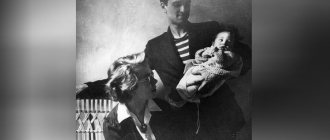Alexey Batalov equally brilliantly succeeded in the roles of a simple driver, a nuclear physicist, and a Chekhovian hero. He spent months preparing for almost every one in order to create a convincing image on screen. Before “The Rumyantsev Case,” Batalov passed a truck driving test, for the role of the gymnast Tibula in “Three Fat Men,” he spent a year learning to walk on a tightrope, and the main role in the film “My Dear Man” forced him to go to the operating room and learn the basics of being a surgeon.
If you were planning on spending one of your evenings this week watching a good old-fashioned movie, we've got nine options.
"Big Family" (1954)
The role of the modest riveter worker Alexei Zhurbin in the film epic “Big Family” brought Batalov national fame, and it was after this that he began to be recognized on the street. The talented 26-year-old guy was noticed by director Joseph Kheifits, who immediately invited him to play one of the main roles. I believed in his abilities and charisma: “Alexey is very noble and efficient.” The artist lived up to expectations. They became friends. A year later, the film won a prize at the Cannes Film Festival for “Best Acting Ensemble.” In interviews, Batalov often recalled Kheifits, emphasizing that it was Joseph Efimovich who helped him understand that cinema was his life’s work.
"The Rumyantsev Case" (1955)
Kheifits, pleased with Batalov’s work in the last film, invited him to the next one. This was one of the first Soviet psychological detectives, “The Rumyantsev Case”. The actor also played the main role - the driver Sasha Rumyantsev, whose acquaintance with corrupt officials brings him to the OBKhSS. The phrase “The Tambov wolf is your comrade!”, which the police captain angrily throws at Rumyantsev during interrogation, later became popular. The film received a prize at the Karlovy Vary Film Festival.
Batalov approached his work very responsibly, remembering the main testament of Konstantin Stanislavsky (with whom, by the way, his uncle, actor Nikolai Batalov, worked) - “to be, and not to appear.” Before filming, the actor talked a lot with the drivers, in some ways adopted their style of communication, and asked about the intricacies of the work.
He also learned to drive large trucks quite quickly. There is a scene in the film in which Rumyantsev is carrying children in the back, so the actor had to get a license of the appropriate category. “Now I have another profession, in reserve,” he liked to joke.
Gitana Leontenko
In 1953, the film “The Rumyantsev Case” was filmed in Leningrad. Batalov played the main role. The film also starred Sergei Lukyanov, who once suggested that he go to the circus. It was there that Alexey Vladimirovich first saw the woman who would later become his second wife. In the arena, the beautiful horsewoman performed a difficult routine, and her skill captivated the actor.
In the evening, Batalov and his colleagues went to a restaurant, where they again saw the black-haired circus performer. They met. The next time they met was six months later. But even then they only exchanged a couple of phrases.
For a long time they communicated sporadically. Batalov proposed to Gitana only ten years after they met. A modest wedding was celebrated in a small rented apartment.
Despite his all-Union fame, Batalov earned little at that time. They rented housing for five years and only in 1968 received an apartment. In the same year, daughter Masha was born.
What Svetlana Svetlichnaya, who turns 80 on May 15, looks like today
In our country they will call it salad or sauce, and in Mexico salsa: the most spectacular variations
Jennifer Lopez's daughter is 12 years old^ and she became the author of a children's book
"The Cranes Are Flying" (1957)
In 1957, Mikhail Kalatozov’s war drama “The Cranes Are Flying” based on Viktor Rozov’s play “Forever Living” appeared on the screens. In 1958, the film received the main prize at the Cannes Film Festival - neither before nor after it was there another Soviet film that received this award. Alexey Batalov, who played a soldier separated from his beloved, was hit by a second big wave of fame.
His partner in the film was Tatyana Samoilova. Even during the auditions, the director noticed that the actors looked very well and harmoniously together, and approved them only because of this. And then rehearsals began. Kalatozov wanted to achieve perfection in everything; the same scene could be rehearsed for several days. Batalov had to fall into a puddle for three days with the words: “I’m not wounded, I’m killed.”
The artists later noted that the work was incredibly difficult, but no one complained. We even rehearsed in our free time, at our own request. On one of these days at the dacha, Batalov had an idea: he drew Samoilova’s arrows on her eyelids (with burnt matches!) and said that this is the kind of Veronica all girls would want to be like. Batalov also knew how to keep secrets. He alone knew that the actress was sick with tuberculosis. Having learned about the illness in the midst of filming, Samoilova was afraid to tell the director - what if they would remove her from the role? Batalov was silent.
By the way, for him, working in the film could have ended in tragedy: during the filming of a fight scene, Batalov fell face down on a chopped off tree branch. He was afraid that a huge scar would remain, but it worked out: the surgeon Ivan Porosenkov, into whose hands the actor fell, darned both his nose and cheek with jewelry.
"My Dear Man" (1958)
In 1958, Joseph Kheifits began work on a melodrama about a talented military doctor who loved one woman all his life. The director suggested Inna Makarova and Alexey Batalov to play the main roles. The latter, of course, agreed and went straight to the operating room. As before filming “The Rumyantsev Case,” the actor decided to study the profession of his hero. The consultant was the same surgeon Porosenkov, who saved the actor’s face during the filming of Kalatozov’s film. He taught Batalov how to use medical instruments.
The Soviet Screen magazine named the film the best picture of the year. Writer Yuri German, whose novel “The Cause You Serve” formed the basis for the script, used some of the plot devices invented by Kheifitz in the following books. Thus, “The Cause You Serve” had two sequels - “My Dear Man” and “I am Responsible for Everything.”
"Lady with a Dog" (1960)
Having decided to invite his favorite actor to play the role of Dmitry Gurov in the film adaptation of Chekhov’s “Lady with a Dog,” Kheifitz for the first time encountered misunderstanding. The director's friends and colleagues dissuaded him, despite their respect for Batalov. Everyone was sure: he is a wonderful artist, but to play Chekhov’s hero, you need to be older and more experienced.
The director didn’t listen to anyone: he knew that Batalov would surprise everyone. As usual, the actor did a lot of preliminary work. To create the desired gait, he began to wear larger shoes and grew a small beard, which made him look older. In an interview, Batalov recalled that if it weren’t for Kheifits, he would never have played Gurov. “I called him Papa Carlo. For my profession, he hewed me like a log boy,” said the actor.
The film was highly appreciated both in the USSR and abroad. A prize at the Cannes Film Festival, at the International Film Festival in London, a diploma from the British Film Academy - and this is not a complete list.
Childhood and youth
Alexey was born into a theater family. Parents and almost all relatives worked at the Moscow Art Academic Theater. His father and mother met when they were very young. Father, Vladimir Petrovich Batalov (1902-1964), was from Moscow, and mother, Nina Antonovna Olshevskaya (1908-1991), from Vladimir.
At the age of 17, she came to Moscow, where she studied acting in a studio at the Art Theater with Stanislavsky himself (the course director). At the age of 18 she married actor Vladimir Batalov. Alyosha’s entire early childhood was connected with the theater; until the age of five, the boy was constantly there. I grew up among sets, made-up artists, backstage, endless rehearsals and performances.
From childhood, Alyosha knew that theater and acting were his destiny. He never even considered other options in choosing a profession. The theater stage replaced playgrounds and sandboxes for him.
In the 30s, the parents separated. In 1933, Alexei’s mother got married, and from the age of five the boy grew up in the family of the writer, playwright, screenwriter Viktor Efimovich Ardov (1900-1976). His stepfather took care of Alyosha as if he were his own son, raising him to be a highly moral person. After the divorce, Alexey communicated with his father, as he continued to live and work in Moscow, collaborating with Stanislavsky.
In Moscow, the Ardov family lived in the Writers' House on Ordynka. Regular guests of the family were movie stars and great writers. These meetings with various literary figures greatly influenced the development and formation of Alyosha, and his attitude towards his future life. Among the frequent guests in their house were Mandelstam, Zoshchenko, Pasternak, Brodsky and many others.
The most frequent guest was Anna Andreevna Akhmatova, who was a friend of her mother. She often visited them; during her visit, Alyosha always gave her his room. Anna Andreevna remained an example of vital stamina and courage for the boy throughout his life.
The war that began in 1941 greatly influenced the formation of Alexei’s new views on life. Alyosha spent this period in evacuation to Tataria, where his mother created her own theater, continuing to do her favorite job. The son helped his mother and played his first small roles in plays. They often performed in military hospitals for seriously wounded soldiers who defended their homeland.
Alyosha left Moscow as a thirteen-year-old teenager, and returned as a young man who had seen what war and grief were. During the evacuation, Alyosha learned a lot: chop wood, understand stoves, and much more.
After school, Alyosha and his mother returned to Moscow. In the city, he graduated from the school for working youth, and then entered the Moscow Art Theater School named after Nemirovich-Danchenko at the Gorky Moscow Art Theater of the USSR. Alexey always believed that it was destined for him to become an artist.
The young man studied in the workshop of People's Artists, actors and theater directors Sergei Kapitonovich Blinnikov (1901-1969) and Viktor Yakovlevich Stanitsyn (1897-1976), who was Alexei's uncle. At university I tried to behave modestly.
Despite the famous surname of Alexei and his relatives, the teachers made high demands on the young man, and he tried to meet them . He tried to prove that he was worth something, despite his famous artist relatives. In 1950, Alexey graduated from a theater university, becoming a certified actor. His diploma was signed by Chekhov’s wife herself, recognizing the young man’s talent.
"Nine Days of One Year" (1961)
Another picture in Batalov’s career, awarded with numerous awards. Among them are the State Prize of the RSFSR named after the Vasiliev brothers, the Golden Globe at the Karlovy Vary festival, and diplomas from international film festivals in Melbourne and San Francisco. According to the Soviet Screen magazine, Batalov was recognized as the best actor of the year.
The role of the obsessed nuclear physicist Dmitry Gusev could have gone to another actor. Director Mikhail Romm took a thorough approach to filming, even inviting Nobel Prize winner in physics Igor Tamm as a scientific consultant. I wanted everything to be as authentic as possible. And suddenly Batalov, who knows absolutely nothing about nuclear physics, asks for the role. Romm refused, Batalov insisted on trying. For this reason, he even interrupted his treatment in Crimea (even during the filming of “The Lady with the Dog,” the actor began having problems with his eyes). Then the director admitted that no one could have done this role better than Batalov.
Batalov’s personal life: two wives, two daughters
There were two marriages in the life of Alexei Vladimirovich. The first one was fleeting - he was only 16 when the decision came to marry his childhood friend Irina. She was the daughter of K. Rotov, a famous painter. They had a daughter, Nadya. But this period coincided with the beginning of an active acting career. The young husband could not be torn and devote time to the theater, cinema and his wife and daughter. Batalov himself admitted that he was a useless father for Nadenka. The marriage predictably ended after 3 years. And the relationship no longer worked out - Batalov did not communicate with his wife and daughter. They met once a year at most.
Perhaps as punishment or as an opportunity to correct this mistake, Batalov had a second daughter, Mashenka. She was born married to circus rider Gitana Leontenko. They married in 1963 and the couple had a daughter diagnosed with cerebral palsy. They say this is a consequence of a medical error. The girl demanded increased attention and Gitana soon retired from her career, completely devoting herself to raising her daughter. Father also tried to devote as much time as possible to Masha. And it bore fruit. Despite such a terrible diagnosis, she was able to become a full-fledged member of society, graduate from VGIK, and become a writer and screenwriter. She was accepted into the Russian Writers' Union.
"Three Fat Men" (1966)
In 1966, the fairy tale film “Three Fat Men” based on the story by Yuri Olesha was released - Batalov’s first and last work in this genre. He not only played the role of the gymnast Tibul, but also became one of the directors - together with Joseph Shapiro. This is Batalov’s second directorial experience; the first, the film “The Overcoat” (1959) based on Gogol, was never shown on the big screen.
Before filming, Batalov learned to walk on a tightrope for more than a year - for the sake of one single episode. Of course, it would have been possible to invite stunt doubles, but the actor wanted to perform the stunt himself. His wife, circus performer Gitana Leontenko, helped him in this.
Guilt
There were rumors that the gypsy relatives of Gitana Leontenko did not accept Batalov. And she even cursed me. That’s why the couple had a sick child. But this was just gossip - the doctors who made a fatal mistake were to blame for the illness of Batalov’s daughter. Nevertheless, Alexey Vladimirovich blamed himself for Masha’s illness all his life. If he had been in Moscow that day, he would certainly have insisted on the operation, and his daughter would have been healthy.
People in self-isolation in Italy chose the competition song Fai Rumore as their anthem.
Easing quarantine in Germany could cause exponential growth of the disease
The boy paid for the fact that his parrot decided to “take part” in an online lesson
"Star of Captivating Happiness" (1975)
Alexey Batalov immediately agreed to play Sergei Trubetskoy in the most touching Soviet film about the wives of the Decembrists. Along with him on the set were Oleg Strizhenov, Irina Kupchenko, Eva Shikulskaya, Igor Kostolevsky, Alexander Porokhovshchikov, Oleg Yankovsky, Vasily Livanov.
He has been friends with director Vladimir Motyl for a long time and has said more than once that he can only act with friends, because only they understand how much effort Batalov puts into each role. He considered Motyl to be a professional with an excellent knowledge of Russian history. “For me, remembering those times every time is joyful and pleasant,” said the actor.
What did Batalov die from?
Alexey Batalov died at the age of 88 in his sleep. And although the age was considerable, no one expected this. 5 months before, Alexey Vladimirovich underwent joint replacement surgery after a leg injury, underwent rehabilitation at the central clinical hospital for rehabilitation treatment at the Goluboe sanatorium and was on the mend.
On the night of June 15, 2020, Batalov died calmly in his sleep. The cause is sudden death. Friends said that the priest came to see him the day before. They talked for a long time, the actor received communion after confession. But he fell asleep and did not wake up - death in a dream is considered easy and a gift for a life well lived. The farewell to the people's favorite took place on June 19 with the participation and help of Nikita Mikhalkov. Alexey Vladimirovich was buried next to his mother at the Preobrazhenskoye cemetery.
“Moscow Doesn’t Believe in Tears” (1979)
In 1979, Alexey Batalov was already teaching acting at VGIK, and the film set was far from first on his list of priorities. At the same time, director Vladimir Menshov could not find an actor who would correctly convey the character of the hero of the new film “Moscow Doesn’t Believe in Tears.” The role of locksmith Gosha was more complicated than it seemed at first glance. Time passed, there was no artist. Menshov was in despair, he said that everyone he looked at during auditions was not the same... But one day he saw a film with Batalov on TV and immediately called him.
At first the actor refused, but then changed his mind - he read the script again and realized that for the sake of this film it was worth changing plans. Then he did not yet know that it was Gosha (aka Goga, aka Georgy Ivanovich) who would give him the USSR State Prize, and the film about the fate of a strong woman Katya Tikhomirova would become the box office leader in 1980, it would be watched by about 90 million viewers.
Today, “Moscow Doesn’t Believe in Tears” remains one of the most famous Soviet films. He is well known in other countries - in 1981 he was awarded an Oscar for best foreign language film.











